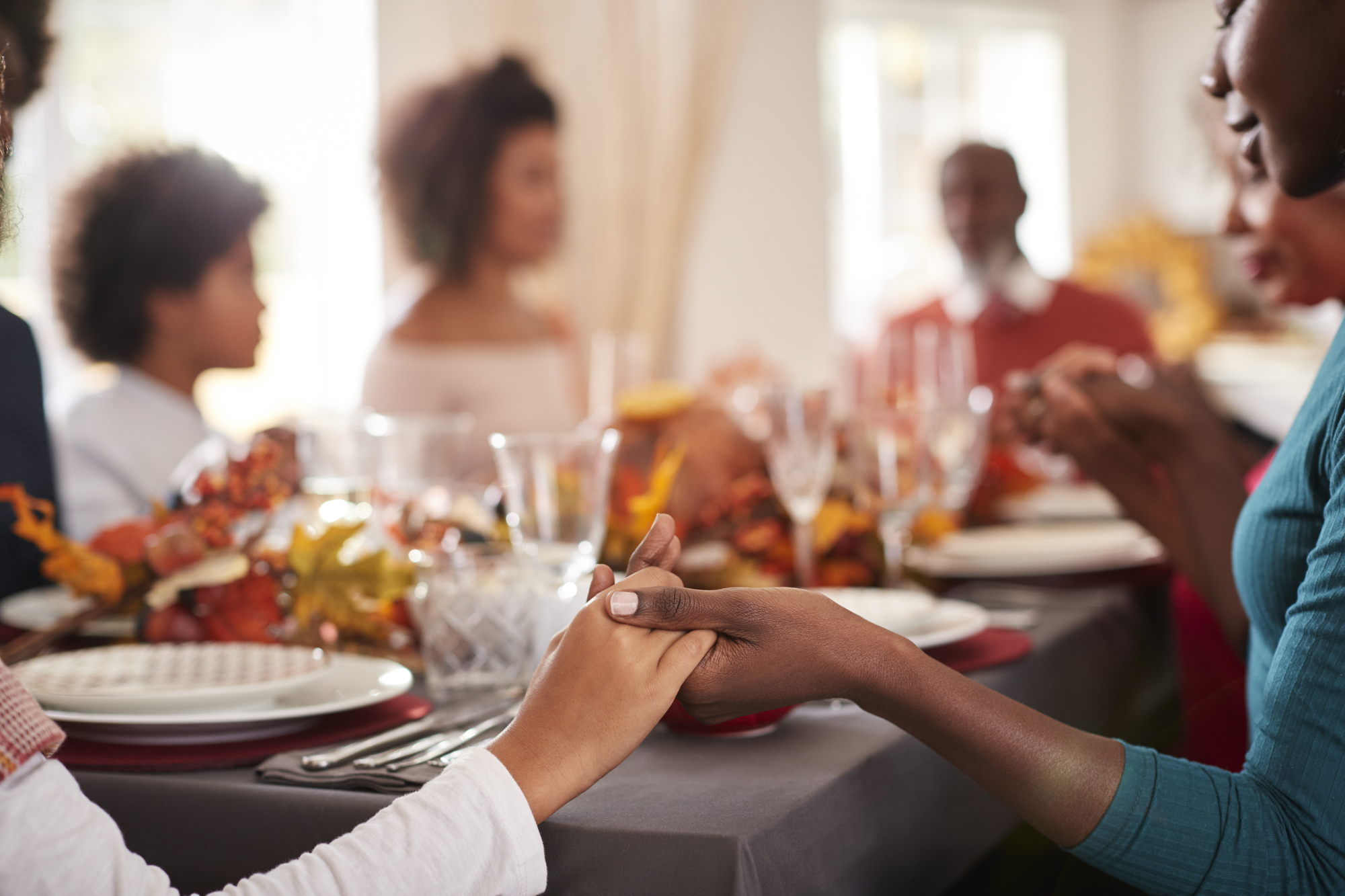Saying grace before a meal, whether you’re the host or guest, can be nerve-wracking. Here’s help for saying grace amazingly well in all situations.

Why Many People Are Uncomfortable Praying or Saying Grace Aloud
Two of the most common fears people share are public speaking and heights. I bet if we took a poll, we’d be surprised to find out that for a lot of folks, their third biggest fear is praying out loud, even if it’s around people they know. It ties in to the general fear of public speaking, but with praying or saying grace in front of others, there’s an extra added something that makes people feel they’ve got to get it perfect.
After all, no one wants to be known as what Corbett, my youngest son, calls a bad “pray-er.” 🙂
When he was younger, after every prayer, the same short conversation would repeat itself:
“Mom, did I do OK? I don’t want to be a bad pray-er?”
“Babe, your prayer was beautiful. Besides, no one is bad at praying. We’re God’s children. He’s happy to hear from us and loves whatever conversation we have with Him.”
“If you say so, Mom. I just always ask in case today was the first day I messed up. I’m talking to God. I really want to get it right!”
What If You Mess Up While Saying Grace?
I’ve totally felt the pressure to get it “right,” too. I remember the years when nothing in the world could have gotten me to pray out loud. And I remember slowly getting over my fear by at first writing out what I was going to say in advance and practicing it. By the way, there’s nothing wrong with doing that, if doesn’t make you less spiritual or authentic. So do it if you think it will be helpful.
Like public speaking, praying aloud gets easier the more you do it. When you pray out loud ten times or so, and realize that afterwards no one has ever thrown rotten tomatoes at you, praying out loud or whatever thing you’re afraid of exerts less and less fear over you.
When it comes to knowing how to say grace, it’s only natural to wonder whether what you’re about to say is the best thing to say. After all, you’re about to say it in front of a group of people, maybe some of whom you don’t know, while gathered around a beautifully decorated table, before eating a meal that took hours and hours to prepare!
There’s a certain pressure we put on ourselves to make our words do justice to the people around the table, the holiday we’ve gathered together to celebrate, and the meal we’re about to enjoy as part of it.
Although it’s impossible to be a bad “pray-er,” there are some best practices for saying grace that can help calm your nerves and give you words to say if your own words suddenly escape you.
The 10 Manners of Saying Grace Amazingly Well
1. It’s the host’s honor to say grace.
Even at a multi-generational meal, the homeowner of the house where everyone has gathered is the host. The host or hostess is traditionally the one who says grace. If neither are comfortable saying it, they can ask someone else to do the honor, if that person is willing. If there is an elder member of the family — grandpa or grandma, for example — who has been saying grace for years at holidays, then of course it would be fine to continue that tradition. (For more about host and guest duties, and to know how to handle some of the awkward situations that arise at Thanksgiving, check out this popular post: The 7 Manners of Thanksgiving.)
2. If one is present, a member of the clergy usually takes the place of the host to say grace.
However, the host certainly may say it if desired. Or one of them can begin and the other finish. The host just needs to make sure to talk to the clergy person ahead of time.
3. Always ask people privately (even clergy members) whether they would like to say grace.
If you ask them publicly to say grace and their answer is no, it’s going to be awkward for everyone. So make sure to ask privately and with enough lead time that the person can think about what to say. (Allow at least ten minutes.) If someone asks you to say grace and you’re not comfortable doing so, you can simply answer, “Thank you for asking. Not today. You’ll want to ask someone else.”
4. Reverence trumps humor.
“Good food, good meat, good God, let’s eat!” That humdinger of a grace was offered up by my 40-something-year-old big brother at a family Thanksgiving dinner a few years ago. It made even my mom laugh — for a moment — but my husband followed it up with a prayer that showed respect, and also gratitude for our blessings. We wondered why my brother, the shyest person in our entire family, offered to say a quick grace. It turned out that a friend of his had said it at a meal. My brother had thought it was so funny that he had been waiting months till he could share it. He was thrilled with himself, and he still thinks that the looks on everyone’s faces made it all worthwhile. He’s probably right! Still, unless you’re Jimmy Fallon, you might want to leave the comedy out of your grace, because it easily can come off as irreverent even if you didn’t mean it that way.
5. Your grace can be original or one that someone else wrote.
If you read your grace, before doing so, share how you came across it and why it’s meaningful to you. Your framework will help others appreciate it more. If you’d like a book of graces, 100 Graces: Mealtime Blessings is full of graces and blessings for just about any occasion. Many of them are short enough to memorize. Learn one or two, and you’ll always have them at your ready.

6. If your grace is one that you’re saying from your heart, there are certain things that are nice to include.
In addition to thanking God for the food and asking Him to bless it, you might want to ask for a special blessing for each person in the room. You don’t have to name each person and each blessing, especially in a group of more than six people. However, if someone is going through a hard time or has something very special to celebrate (and you’re positive that it’s common knowledge to everyone in the room), then you can mention those things even though other people are left out. For instance, if Aunt Lauren is undergoing chemotherapy, you could ask for strength for her through the treatment and total healing. And if Jessica and Caleb are getting married this coming February, it’s a great time to ask that their marriage be blessed. It’s also nice to let everyone join in on the Amen (so be it). To let everyone know, you could end your grace something like this: “And in one accord, we join together to say … Amen!”
7. Grace can be offered sitting or standing, and at the table or away from it.
If everyone isn’t going to be sitting at the same table, make sure to call all the guests together in the same room while grace is being said. It’s nice to hold hands, whether you’re sitting around one table or standing in the family room, but you don’t have to.
8. Nothing at the table is touched or passed until after grace is said.
This is a long-standing etiquette that will never fade. To show reverence, nothing at the table is passed, and although people can sit if the host chooses, no one should place their napkin on their lap, or take a drink, until after grace is said. The table is left untouched until the One who provided everything on the table is thanked!
9. If you’re not a believer or you practice a different religion, you don’t have to participate fully if you’re not comfortable doing so.
You’ll want to join your host(s) and fellow guests when grace is being said, and follow your hosts’ lead by standing or sitting when they do, closing your eyes, and bowing your head. You don’t need to say Amen or join them in reciting any part of the grace they might say in unison.
10. A lengthy grace isn’t any more spiritual than a shorter one.
The house is full of people, everyone is hungry, the turkey is drying out, and the other food is getting cold. It’s fine if your grace is short. God doesn’t time you. It’s your heart’s true measure of gratitude that matters most, and not how long you shared it in words!
When You Don’t Know What to Say, Reading Scripture as Your Grace Is a Great Idea
When you’re at a loss for words when saying grace, go to the source — the Bible. Reading a scripture verse or passage makes for lovely blessings and graces. Simply read the verses directly from the Bible, or write them out in advance on an index card.
What Are Some Bible Verses That Are Great for Using as Graces or Blessings?
Here are six Bible verses and short passages you might consider.
1.) Psalm 100 (NIV)
1 Shout for joy to the Lord, all the earth.
2 Worship the Lord with gladness;
come before Him with joyful songs.
3 Know that the Lord is God.
It is He who made us, and we are His[a];
we are His people, the sheep of His pasture.
4 Enter His gates with thanksgiving
and His courts with praise;
give thanks to Him and praise His name.
5 For the Lord is good and His love endures forever;
His faithfulness continues through all generations.
2.) I Thessalonians 5:16-18 & 23-24 (NIV)
16 Rejoice always,17 pray continually, 18 give thanks in all circumstances; for this is God’s will for you in Christ Jesus.23 May God Himself, the God of peace, sanctify you through and through. May your whole spirit, soul and body be kept blameless at the coming of our Lord Jesus Christ. 24 The One who calls you is faithful, and He will do it.
3.) Hebrews 13:15-16 (NIV)
15 Through Jesus, therefore, let us continually offer to God a sacrifice of praise — the fruit of lips that openly profess His name.16 And do not forget to do good and to share with others, for with such sacrifices God is pleased.

4.) Phillippians 4:4-8 (NIV)
4 Rejoice in the Lord always. I will say it again: Rejoice! 5 Let your gentleness be evident to all. The Lord is near. 6 Do not be anxious about anything, but in every situation, by prayer and petition, with thanksgiving, present your requests to God. 7 And the peace of God, which transcends all understanding, will guard your hearts and your minds in Christ Jesus.8 Finally, brothers and sisters, whatever is true, whatever is noble, whatever is right, whatever is pure, whatever is lovely, whatever is admirable — if anything is excellent or praiseworthy — think about such things. 9 Whatever you have learned or received or heard from me, or seen in me — put it into practice. And the God of peace will be with you.
5.) Matthew 5: 1-12 (NIV)
(The Beatitudes, Jesus’ introduction to the Sermon on The Mount)
1 Now when Jesus saw the crowds, He went up on a mountainside and sat down. His disciples came to Him, 2 and He began to teach them.
He said:
3 “Blessed are the poor in spirit,
for theirs is the kingdom of heaven.
4 Blessed are those who mourn,
for they will be comforted.
5 Blessed are the meek,
for they will inherit the earth.
6 Blessed are those who hunger and thirst for righteousness,
for they will be filled.
7 Blessed are the merciful,
for they will be shown mercy.
8 Blessed are the pure in heart,
for they will see God.
9 Blessed are the peacemakers,
for they will be called children of God.
10 Blessed are those who are persecuted because of righteousness,
for theirs is the kingdom of heaven.
11 Blessed are you when people insult you, persecute you and falsely say all kinds of evil against you because of Me.
12 Rejoice and be glad, because great is your reward in heaven, for in the same way they persecuted the prophets who were before you.”
6.) Another excellent blessing or grace is I Corinthians 13:1-13 (NIV). This is the famous chapter in the Bible where the Apostle Paul shares what love is and is not.

Examples of Prewritten Prayers for Thanksgiving
Here are two prewritten prayers for Thanksgiving for your consideration.
1.) Growing up, my family attended a Moravian Church for several years. This is an old, old Moravian blessing of thanksgiving:
Come, Lord Jesus, our guest to be
And bless these gifts
Bestowed by Thee.
And bless our loved ones everywhere,
And keep them in Your loving care.
2.) And here is a prayer from a contemporary writer:
Dear God,
Thank you for your great love and blessing over our lives.
Thank you that your favor has no end, but it lasts for our entire lifetime.
Forgive us for sometimes forgetting that You are intimately acquainted with all of our ways, that You know what concerns us, and You cover us as with a shield.
We ask that we would walk in Your blessing and goodness today.
That Your face would shine on us.
That You would open the right doors for our lives and for our loved ones, that You would close the wrong doors and protect us from those we need to walk away from.
Establish the work of our hands and bring to fulfillment all that You have given us to do in these days.
We pray that You would make our way purposeful and our footsteps firm out of Your goodness and love.
Give us a heart of wisdom to hear Your voice, and make us strong by your huge favor and grace.
In Jesus’ Name, Amen.
Author: Debbie McDaniel

Examples of Prewritten Thanksgiving Poems
If a poem is more your style than a prayer, or if you would like to share both by saying grace at the start of the meal and a poem before serving dessert, here are three poems. One of them might be just what you’re looking for.
1.) Thanksgiving (by Ella Wilcox)
There’s not a day in all the year
But holds some hidden pleasure,
And looking back, joys oft appear
To brim the past’s wide measure.
But blessings are like friends, I hold,
Who love and labor near us.
We ought to raise our notes of praise
While living hearts can hear us.
Read the full poem by clicking here.
2.) When Giving is All We Have (by Alberto Rios)
We give because someone gave to us.
We give because nobody gave to us.
We give because giving has changed us.
We give because giving could have changed us.
We have been better for it,
We have been wounded by it—
Giving has many faces: It is loud and quiet,
Big, though small, diamond in wood-nails.
Read the full poem by clicking here.

What’s Next?
I wish you and your family a wonderful holiday! May your day be filled with the gifts of a happy home: friends, family, laughter, food, and most of all a grateful and satisfied heart!
Until next time, keep doing what only you can do! Bless the world by being YOU…at your authentic best!
Hugs and blessings,



